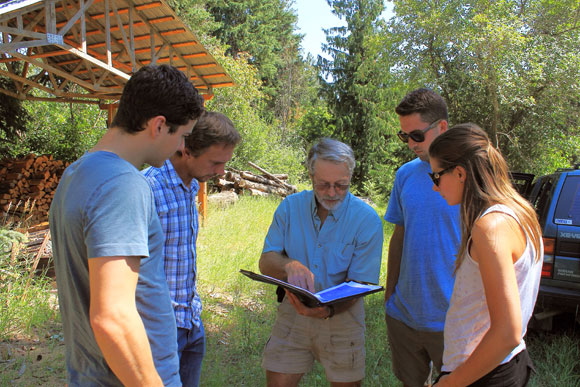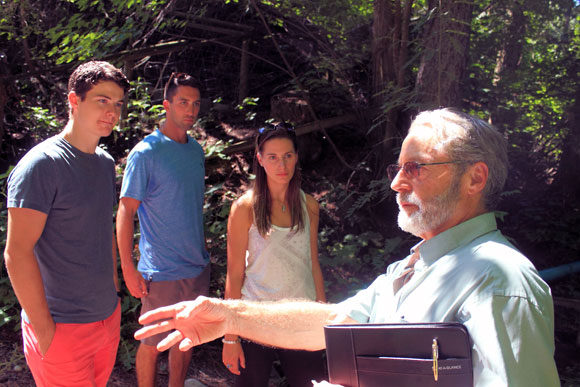
Using an aerial map of the Hulcar Valley north of Armstrong, BC, Steele Springs Water District chairman Brian Upper, centre, explains to UBC researchers Ted Wannop, John Janmaat, Quinn Rochon and Maryssa Soroke where the springs are located.
Research helps identify opportunities and challenges to watershed management
Three undergraduate students from UBC’s Okanagan campus have been visiting small West Kootenay communities, interviewing residents to better understand the challenges and issues of watershed management.
“Small watershed management is important,” says Ted Wannop, economics undergraduate in the Irving K. Barber School of Arts and Sciences. “It supplies humans with arguably their most fundamental need for survival: clean water.”
Some communities in BC are struggling to provide safe drinking water through their small distribution systems and there is little public funding available for most districts to deal with watershed issues, says Wannop.
“We want to find out what the common factors are restricting these small systems from achieving clean water. Is there a funding or social model that a trouble-ridden community can adopt to address a water quality or quantity issue?”
Under direction of John Janmaat, associate professor of economics and Regional Innovation Chair in Water Resources and Ecosystem Sustainability, Wannop and fellow undergraduate students Quinn Rochon and Maryssa Soroke set out to tackle the problem. The research team mailed about 700 letters to people in the West Kootenay regions of Glade, Salmo, Crescent Valley and Kootenay Lake, with the goal of doing about 100 in-person interviews.
Questions will draw out information about the community, how members work together on water management, and if their approach is successful. They are also researching the local environment, querying people’s knowledge of the local watershed, and examining activities that harm the watershed, and quality and quantity of drinking water.
“Small water system issues we’ve identified thus far tend to be around the age and quality of infrastructure, as well as boil-water advisories, or even do-not-consume advisories, “ says Janmaat. “The reasons are varied: sometimes communities just don’t have the funds to upgrade their system, or they can’t afford to hire the kind of expertise necessary to operate the system.”
The team also found that municipalities can be reluctant to work with government agencies. Janmaat notes that communities are growing, and expectations vary significantly about how water should be managed, delivered and used.
“Sometimes it’s simply that the communities are struggling to work together,” he says.
Water resource management is a fundamental component of health, industrial activity and recreation, says Rochon. “As populations grow and industry expands, I think it is becoming increasingly important for us to be aware of, and be involved in, the way that we handle our limited water resources.”
The UBC research team also conducted detailed interviews with about 30 experts from across BC with knowledge in the management or regulation of small watershed systems or activities related to water, to see if any common themes emerge.
Their interview findings, along with the results from a comprehensive literature review, will be analyzed and presented to the stakeholders and partners to help decide the feasibility of a long-term research project directed at building more effective, community-based watershed management.
Project partners include Interior Health, consulting firm Urban Systems, the Columbia Basin Trust, and the Okanagan Nation Alliance.
“This research is so important because water management has not been largely studied in BC,” says Soroke. “Understanding how we can sustainably manage it for the future will be of great importance to not only ensure we have enough for all, but also to keep it clean and keep our water sources healthy as well.”

Brian Upper, chairman of the Steele Springs Water District, explains to UBC undergraduate researchers Ted Wannop, Quinn Rochon, and Maryssa Soroke how the water is collected from springs and brought down to a pumphouse and reservoir that supplies water to 56 homes in the system.
—30—